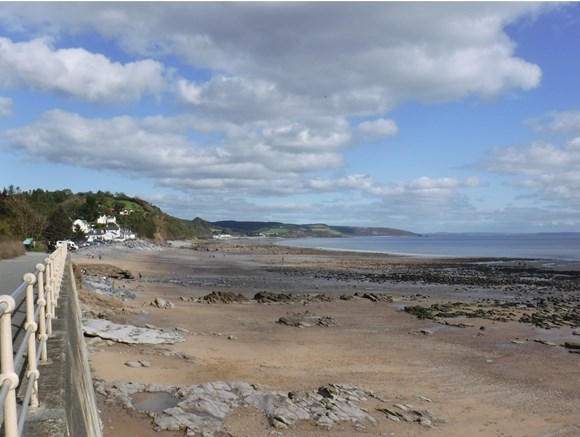News
Pembrokeshire bathing waters: It wasn’t always this way

IN THE south western corner of Wales lies Pembrokeshire, a beautiful place that attracts millions of tourists each year and is currently celebrating having some of the cleanest bathing waters in the United Kingdom.
The county has 29 designated bathing waters – almost a third of all those in Wales – and latest results from our Wales Bathing Water Quality Report 2020 show that 27 of those have achieved the highest ‘excellent’ status, with the remaining two achieving ‘good’.
The bathing water sampling season usually runs from the 15 May to 30 September and tests all 105 designated bathing waters around Wales on their water quality. Water samples are taken away, analysed in a specialist laboratory and assessed against a set criteria.
At the end of the season the results will be compiled for each bathing water and used to assess the water as ‘poor’, ‘sufficient’, ‘good’ or ‘excellent’.
This means that local residents and the millions of tourists that flock to Pembrokeshire, can take a dip in the sea safe in the knowledge that they are swimming in some of the cleanest waters in the UK.
But it hasn’t always been that way.
Rod Thomas, a senior environment officer for Natural Resources wales, has lived in Pembrokeshire all his life, and worked as an environment officer within NRW for more than 30 years.
Here Rod tells the story of how strong partnership working and a joint commitment to making a change has made Pembrokeshire the county with the highest number of excellent rated bathing waters in Wales.
Change was no accident
I was born and raised in Pembrokeshire. I love it here and visit our beaches as often as I can.
I’m so proud of what has been achieved, and to be part of the Pembrokeshire Environment Team that has played such a massive role in turning things around for our bathing waters.
This change was no accident. It is the result of a lot of hard work by all parties involved.
Top three issues – tourism, sewage treatment and farming.
Our bathing water issues resulted from a combination of problems, with the top three issues being:
- the impact of tourism
- out-dated sewerage systems
- impacts from agriculture
- Partnership working and Pembrokeshire Beach Strategy
We started to achieve change when organisations pulled together, and we took a partnership approach to the issue. Welsh Water started to make improvements to their waste management systems, while NRW proactively visited areas to identify pollution problems. In addition, Pembrokeshire County Council identified sewer misconnections and enforced dog byelaws to allow dogs on restricted areas of the designated beaches.
In 2018 we formalised this partnership working with the launch of the Pembrokeshire Beach Strategy (2018-2021). This outlines the roles and responsibilities of each organisation and has been our road map to continuous positive change in ensuring that ‘a visit to a Pembrokeshire beach is the best experience that it can be.’
Each beach has a story to tell
Each beach has its own story to tell and demonstrates the range of pollution issues that can affect our bathing waters.
We worked with a local farmer in one area who was keen to help protect the Blue Flag status of a local beach. The farmer changed his practices to ensure that cattle were not allowed to stand in the stream above the beach. By providing an alternative drinking water source, and protecting the water quality of the stream, the beach achieved ‘excellent’ status.
Wiseman’s Bridge
Back in 2011 the bathing water at Wiseman’s Bridge was rated ‘poor’, the lowest standard possible. There was the very real possibility that signage would be required to advise people not to swim there. This was a real challenge for NRW, Pembrokeshire County Council, and all the organisations that it impacted upon, as well as the local economy that relies so heavily on tourism.
The beach is surrounded by caravan sites, as well as properties on private sewerage systems. We carried out a rigourous pollution prevention campaign in the area. We visited all caravan sites, farms and local houses using septic tanks. We found a variety of problems including misconnections.
Several caravan sites had private sewage treatment plants that were old and therefore not working very effectively. The result was poor quality effluent discharging into the stream that led to the beach. We provided site owners with advice and guidance. They took all this on board and went above and beyond what was required, investing in new sewerage treatment systems. The technology includes the use of ultraviolet light treatment plus a reed bed system and results in ‘gin clear’ water.
After seven years of continual improvements this beach now has ‘excellent’ status, a fantastic achievement!
It’s not easy, but change is possible
Improving bathing water quality is not easy, but it is most certainly possible. It requires organisations to work together, chipping away bit by bit over a long period of time. We couldn’t do it without the help of local businesses and landowners.
We will continue to look for opportunities for more improvements to be made. My dream would be for all 29 bathing waters to achieve excellent status.
If we turn our backs on this and stop doing what we’re doing, the quality of bathing waters will decline again. I for one, do not want this to happen.
Stay safe in our waters this summer
If you are planning on visiting some of Wales’ coastlines or inland rivers and lakes this summer, please ensure that you take extra steps to keep yourself and your family safe around water, by assessing the risks before you enter the water and paying more attention to what’s happening around you.
Find out more on how to have a safe and enjoyable time outdoors at Adventure Smart UK, and follow the advice in the Waterside Code and the Wild Swimming Code – part of the Countryside Code family.
The Wales Bathing Water Quality Report 2020 is available to view here, Natural Resources Wales / Wales bathing water quality report 2020.
You can also check the bathing water quality of each designated area here: http://environment.data.gov.uk/wales/bathing-waters/profiles/
Entertainment
What’s not to love about Prince Nathaniel of Neyland?

VAIN, enthusiastic, dramatic and utterly loveable, Prince Nathaniel of Neyland is set to steal hearts on the Torch Theatre stage this festive season in Rapunzel.
Played by the charismatic Harry Lynn, the flamboyant prince is the sort of pantomime hero audiences can’t help but cheer on, even when he is wildly out of his depth. From the moment he steps on stage, Prince Nathaniel is determined to help Rapunzel at every possible turn – even if bravery doesn’t always come naturally.
Describing the role as “wonderfully silly, enthusiastic, and a big-hearted comedic hero,” Harry says Prince Nathaniel is “the epitome of royal bravery,” striking his dramatic “Prince Pose” whenever the moment allows.
“But in reality, he’s often nervous, dramatic, and hilariously out of his depth,” Harry explained. “He’s pampered, easily flustered, and very vain about his hair – to the point where a haircut at Belinda’s salon becomes a full-on event. Beneath all the bravado, though, he’s loyal, caring, and absolutely determined to do the right thing, especially when Rapunzel needs him.”
Harry, who trained at the Royal Welsh College of Music and Drama, believes audiences will quickly fall for the prince’s perfectly imperfect charm.
“He’s confident but clueless, brave but squeamish, and always trying his best,” he said. “And when it really counts, he genuinely steps up. Whether he fully saves the day… well, this is a pantomime, so every hero needs a little help. Let’s just say he plays an integral part in Rapunzel’s fairytale ending.”
A familiar face to panto fans, Harry has just completed a run as Hunk/Scarecrow in The Wizard of Oz at Aberystwyth Arts Centre and says the festive season is his favourite time of year to perform.
“Panto season is pure joy – loud audiences, lots of laughter, plenty of improvisation, and that special festive atmosphere where anything can happen,” he said. “It’s a theatre experience like no other and the perfect way to celebrate Christmas.”
Prince Nathaniel, however, rarely has a quiet moment on stage. He is chased, sprayed, gunged, electrocuted, bashed in the face, tangled in a complicated ladder sequence – and faints, falls, panics, poses and hides behind Belinda whenever fear takes over.
“It’s a lot,” Harry laughed. “The challenge is keeping the comedy big and bold while still maintaining his charm. Having the Prince arrive in full regal mode, only to be sprayed in the face and gunged by Belinda, is peak panto chaos – huge fun to perform and, hopefully, even more fun to watch.”
Rapunzel – the hair-raising adventure runs at the Torch Theatre from Saturday, December 6 to Sunday, December 28. A Relaxed Environment performance takes place on Saturday, December 13 at 2:00pm, with a BSL-interpreted performance on Tuesday, December 16 at 6:00pm.
Tickets are priced at £24.50, £20.00 concessions, or £78.00 for a family ticket. For more information or to book, visit www.torchtheatre.co.uk or call the Box Office on (01646) 695267.
Crime
Cowboy builders jailed after years of bullying and fraud against homeowners

A FATHER and son who preyed on homeowners across south and west Wales — many of them elderly or in poor health — have been jailed after a court heard how they used intimidation and deception to extract huge sums of money for unnecessary and badly executed building work.
Jim Janes and his son, Thomas James, ran a long-running roofing scam that left dozens of victims facing financial hardship, unfinished homes and costly repair bills.
Swansea Crown Court heard the pair routinely targeted householders with minor repair needs before escalating jobs into major works, demanding ever-increasing payments once roofs had been stripped or damaged.
When questioned or challenged, the defendants became aggressive, leaving victims feeling frightened and pressured into paying. In one case, a homeowner was threatened unless money was handed over.
Passing sentence, Judge Catherine Richards said the defendants showed a “cruel disregard” for the impact of their actions and deliberately manipulated vulnerable people for financial gain.
She told the court the offending was driven by greed and a willingness to exploit those least able to protect themselves.
The court heard the fraud continued for more than five years, during which the defendants traded under multiple business names, changed contact details, and used different bank accounts in an effort to avoid detection.
Lee Reynolds, prosecuting, said the pair often dismantled roofs without consent and left properties exposed to the weather, effectively forcing customers to comply with their demands or face further damage to their homes.
Many victims were in their sixties, seventies and eighties, with some paying tens of thousands of pounds. One homeowner lost £100,000.
Independent experts later found that much of the additional work charged for was unnecessary and that the workmanship carried out was of poor quality. In some cases, jobs were left incomplete, requiring extensive remedial work.
Victims told the court how they had been left anxious, ashamed and financially stretched, with some forced to borrow money or remortgage their homes to cover the costs.
Jim Janes, 55, and Thomas Michael Jim James, 37, both of Llangadog, Carmarthenshire, had previously pleaded guilty to fraudulent trading.
In mitigation, the court heard Janes had worked in the building trade for much of his life, while James was said to have played a lesser role in the operation. However, the judge rejected claims that either man bore reduced responsibility.
Sentencing both men to eight years in prison, Judge Richards said they had acted ruthlessly and without any regard for the harm caused to their victims.
Both defendants will serve 40 per cent of their sentences in custody before being released on licence.
A further hearing will be held on Thursday (May 22) next year to consider confiscation proceedings and the imposition of serious crime prevention orders.
Crime
Cocaine dealers jailed after flooding Aberystwyth streets with drugs

TWO men who supplied cocaine in Aberystwyth have been jailed after police seized large amounts of cash, drugs and weapons during coordinated raids.
Luke Hutton, aged 25, and Lee Mark Walsh, 37, were sentenced at Swansea Crown Court after admitting possession of cocaine with intent to supply and possessing criminal property.
The court heard that police attended Walsh’s flat in Aberystwyth on Thursday (Nov 14) to execute a search warrant. Officers saw several people outside the address, including both defendants. When police approached, Walsh remained at the property while Hutton attempted to flee but was quickly detained.
Walsh, of Yr Hafan, Aberystwyth, was found with cannabis, £160 in cash and a mobile phone. Hutton, of Corporation Street, Aberystwyth, was carrying £8,795 in cash and a phone.
During a strip search in custody, officers recovered a wrap of white powder concealed on Hutton. Further searches uncovered £850 in cash laid out on Walsh’s bed, five mobile phones, a silver knuckleduster and a large kitchen knife hidden beneath the bed.
Police also recovered scales with white powder residue, a bank card contaminated with drug traces, and a further bag of white powder elsewhere in the flat. At Hutton’s address, officers found £1,060 in cash, bicarbonate of soda and empty snap-seal bags, consistent with drug preparation.
Prosecutor Dean Pulling told the court both men were clearly involved in drug supply for financial gain.
Walsh also admitted possession of an offensive weapon and possession of cannabis. He has previous convictions for cannabis offences and failing to comply with a drugs test.
Hutton has a longer record, including offences involving communications, driving matters, domestic abuse and breaching a restraining order.
Mitigating for Walsh, Ryan Bowen said the defendant had experienced a troubled childhood, moving schools frequently, and had struggled with cannabis use from a young age. He said Walsh had shown a strong work ethic and hoped to pursue barbering on release.
Jon Tarrant, representing Hutton, said his client had been heavily addicted to cocaine and that drug use had dominated his life, contributing to the breakdown of relationships, including contact with his two young children.
Sentencing, Judge Vanessa Francis said both men had been involved in dealing with the expectation of making “significant financial gain”.
Addressing Hutton, she said: “You told the author of the pre-sentence report that when your benefits stopped, you ‘did what you had to do’. This court will do what it has to do to take off the streets those who spread the misery of drug supply.”
After reductions for guilty pleas, Hutton was jailed for three years and Walsh for 32 months. Both will serve up to half of their sentences in custody before being released on licence.
-

 Crime4 days ago
Crime4 days agoMilford Haven man jailed after drunken attack on partner and police officers
-

 News6 days ago
News6 days agoDyfed-Powys Police launch major investigation after triple fatal crash
-

 Crime3 days ago
Crime3 days agoTeenager charged following rape allegation at Saundersfoot nightclub
-

 Crime4 days ago
Crime4 days agoMan charged with months of coercive control and assaults
-

 Crime5 days ago
Crime5 days agoMan sent to Crown Court over historic indecent assault allegations
-

 Crime5 days ago
Crime5 days agoMilford Haven man admits multiple offences after A477 incident
-

 Crime7 days ago
Crime7 days agoTrefin dog case ends in forfeiture order after protection notice breach
-

 Crime4 days ago
Crime4 days agoWoman ‘terrified in own home’ after ex breaches court order



























